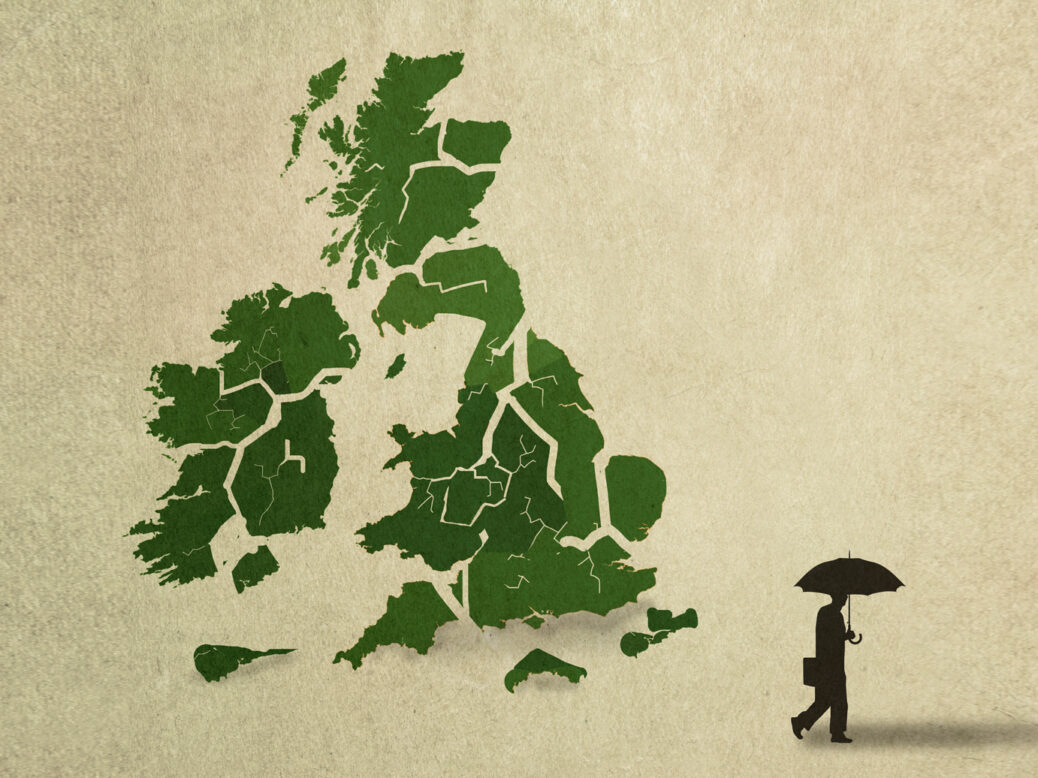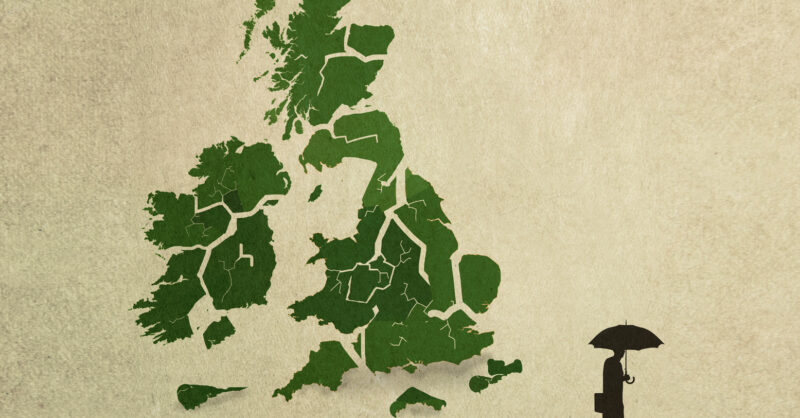
Illustration by Gary Waters / Ikon Images
The truly unnerving thing about the fall of Rome (yes, I’m going there again, sorry) was that most Romans probably didn’t notice it had happened. The final western emperor was formally deposed on 4 September 476 – but everyone, including the bloke who’d deposed him, assumed the place was just being run from Constantinople now, and it took a couple more centuries of sackings, plague and things breaking and not being fixed before anyone decided the empire had actually ended long ago. To those who’d lived through it, the story was more one of decline than fall.
Things breaking and not being fixed – the sneaking suspicion that things might just keep getting worse – has been a theme of British life of late. In too many towns, boarded up shopfronts predominate; shops and restaurants that closed during Covid and never reopened, or did reopen, but as low-value and slightly suspect operations like vape shops or nail bars. A general air of scuzziness has crept in, as councils make their final metamorphosis from the once proud local corporations that built this country, to struggling and underfunded social care funding bodies with an occasional sideline in bins. Meanwhile, social media is awash with stories of police ignoring petty crimes, and immediately marking inquiries as closed, as if there’s no value in investigating and nothing to be done. (When someone is caught expressing support for Palestine, at least, Kent police are on it.)
Even in London, which for all its problems remains far richer than the country it governs, commentators whine about graffiti on tube trains, station lifts out of use due to unspecified motor faults, the year it’ll take to replace just four escalators at Cutty Sark station. Such criticisms are heard most often from the right-wingers who seek to demonise the city and its liberal Muslim mayor alike – but they resonate nonetheless, because they’re not entirely wrong. It does feel absurd that a city that just a few years ago was New York’s only plausible challenger for the title of “capital of the world” now can’t find the parts to fix a bloody lift.
Consider the sorry saga of Hammersmith Bridge, which connects two districts of plush west London. In the 1820s, the bridge took just three years to build; in the 1880s, just five to replace after a boat smacked into it. Now, it’s been closed to motor traffic for six years and counting – the cars may not matter; the buses surely do – and no one has offered a timetable for when that might change. Everyone is waiting on someone else to pay.
I could keep banging on about both the sense of decline and the apparent inability of our government to arrest it – I’ve not even mentioned, say, the looming collapse of the university sector, taking a bunch of regional economies with it, or the 20-year failure to even think about social care. But I want to devote the rest of my wordcount instead to the psychic cost of all this.
For quite a while this country was blessed with a sense of, for want of a better word, progress. Many lived hard lives; for certain people in certain places, things could get worse as well as better. But if you look at the state of the nation as a whole at any point in the 19th or 20th century, you could generally rely on things having improved visibly over the previous, say, 20 years.
That no longer seems to hold true. We’re not significantly richer than we were in 2005, but the cost of living is significantly higher, and the cost of having somewhere to live higher still. Worse, a lot of basic state functions are in remission. We no longer trust that the police will come when called, or you can see a doctor when sick. And we have a prime minister who doesn’t recognise that anything has broken. Perhaps the idea of progress was an aberration. For much of history, even the bits that didn’t have Rome to look back on, the golden age was assumed to lay behind, not ahead, of the present.
Subscribe to The New Statesman today from only £8.99 per month
But that sense that things would get better made a whole load of otherwise near impossible things plausible. You could redistribute resources, because the size of the pie was growing. You could ask people to make sacrifices, because tomorrow would be better than today. How do you do that when too many people don’t have enough, and no longer trust their sacrifice will even help? How can you have progressive politics without any sense of progress?
Tomorrow is not looking better than today. Thanks to a combination of demographics and economics, Vladimir Putin and Donald Trump, there are excellent reasons to imagine it might actually be worse. At least when the Tories were in office, we had the day that they’d lose to look forward to. Now the only plausible change in the offing is Nigel bloody Farage. The emperor isn’t coming to save us. He may yet be the one to cut the aqueducts.
[See also: Gaza will radicalise a generation]
Content from our partners

